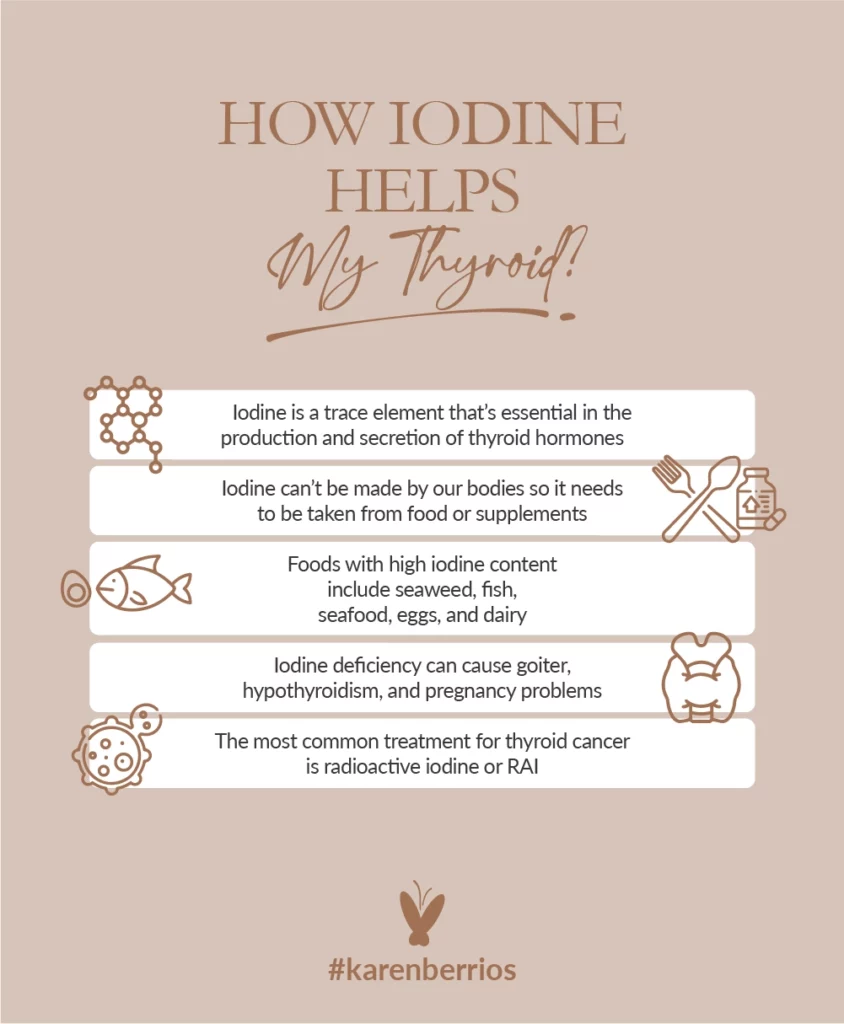

How Iodine Helps My Thyroid?
If anyone in your surroundings ever had any issues with their thyroid, there’s a good chance you heard about iodine. This micronutrient plays one of the most important roles in the health of your thyroid and it’s important to keep it in balance.
Having too much iodine in your system is just as detrimental as having too little, but with different effects on the function of your thyroid gland.
What is Iodine?
Iodine is a trace element that’s naturally occurring in some foods and artificially added to salts. It also exists in supplement form. Your body does not make iodine so it’s important to obtain it from food. The foods containing high levels of iodine include:
- Seaweed such as nori, kelp, kombu, and wakame
- Fish and other seafood
- Eggs
- Dairy
- Beans and legumes
- Enriched flours
- Enriched salts
The recommended dietary allowance (RDA) of iodine for those 15 years old and older is 150 micrograms, and for pregnant and breastfeeding women 220mcg and 290mcg, respectively. These numbers are subject to change from person to person, but generally, if you’re hitting these ranges, you should be fine.
Iodine and Thyroid
Iodine is one of the main and crucial components of the thyroid hormones thyroxine (T4) and triiodothyronine (T3). These hormones regulate a large number of important biochemical reactions in the human body, from your metabolic rate and protein synthesis to brain function and bone health. They are also important when it comes to proper skeletal and central nervous system development in fetuses and babies.
Another important hormone, thyrotropin or thyroid-stimulating hormone (TSH) controls thyroid hormone production and secretion. When there’s an iodine deficiency or there’s too much of it floating around your system, the TSH has a hard time controlling and regulating thyroid hormone production, leading to either an underactive or an overactive thyroid.
Iodine Deficiency
Not having enough iodine in your body causes your thyroid to enlarge as it tries to maintain the hormone production rate. This enlargement is called a goiter and it was a massive problem at the beginning of the 20th century. That’s when the production of iodized salts started, in order to solve a problem amongst the US and Canadian population in the area once known as the “goiter belt.”
Goiter shows up as a big lump in the throat or a very swollen neck. This can create plenty of issues with swallowing and breathing, with potential choking sensations.
Another condition related to iodine deficiency is hypothyroidism or an underactive thyroid. In the US, having hypothyroidism caused by iodine deficiency is very rare and if there’s another underlying condition that caused it, such as Hashimoto’s disease, adding an iodine supplement won’t be of much help.
And lastly, iodine deficiency can be very harmful in pregnancy. It’s been linked to stillbirth, miscarriages, preterm labor, and congenital abnormalities in their infants. Even the mildest cases of iodine deficiency can be associated with low intelligence in children, with the most severe cases resulting in cretinism, a very rare, but incredibly hard condition.
Iodine and Thyroid Cancer
When you’re diagnosed with thyroid cancer, one of the most common treatments you’ll receive is radioactive iodine or RAI. It gets straight into the thyroid gland and destroys all the cells so they can’t uptake any more iodine from the body. This treatment is used to get rid of any residue tissue after surgery or specific types of cancers that have already spread to the lymph nodes and other areas of the body.
If you’re diagnosed with papillary, follicular, or Hurthle cell thyroid cancer (differentiated thyroid cancers), RAI can help prolong your life and manage your symptoms. These are cancers that have spread to other areas of the body.
In the case of smaller cancers, it’s still unclear whether RAI is effective or even necessary as they’re usually dealt with by surgery alone. Anaplastic (undifferentiated) cancer and medullary thyroid carcinomas cannot be treated with RAI as they don’t take up iodine.
How to Prepare for RAI?
If your treatment plan includes RAI, here’s what you need to know before the treatment.
- Your TSH levels need to be high in order for the treatment to be effective. You can do so by not taking thyroid hormone pills for a week before the treatment (making the body release the TSH levels itself) or by taking an injection of synthetic TSH which can help elevate your levels artificially.
- Another important recommendation most doctors will ask of you is to keep a low-iodine diet one to two weeks prior to treatment, in order to prepare the cells to take all the radioactive iodine once it’s administered. Foods that are allowed include all fruits and vegetables, meat, nuts and seeds, olive oil, dark chocolate, bread and pasta (made without enriched flour), and plant-based milk. On the other hand, you should stay away from seaweed, eggs, dairy, fish, and seafood.
In case you’re pregnant or breastfeeding, you should abstain from this treatment as it might be harmful to the fetus.

RAI Side Effects
After the treatment with radioactive iodine, your body will give off radiation for some time, and depending on the dose, you might be asked to stay in the hospital for a few days after the treatment. You’d be kept in an isolated room so you don’t affect other patients. You might also receive specific tips from your doctor on how to protect the ones you’re living with after you’ve been discharged.
RAI has some potential side effects such as:
- Swelling and tenderness of the neck
- Swelling and tenderness of the salivating glands
- Nausea and vomiting
- Changes in taste
- Dry mouth
- Eye dryness (reduces tear formation)
- Low sperm counts and potential infertility in men
- Irregular periods in women
Very rare and severe complications of RAI show a slightly increased risk of developing certain cancers like leukemia, stomach cancer, and salivary gland cancer in the future. Even though they’re extremely rare, some studies do exist, and it’s important to mention them.
Final Thoughts
Iodine is an essential trace element when it comes to the health of your thyroid gland and its optimal function, helping you keep hormone production balanced. In cases of iodine deficiency, certain actions must be done in order for it not to cause more problems down the road.
But, if you’re fighting thyroid cancer, radioactive iodine therapy might be one of the treatments suggested to you by your healthcare provider. In cases of specific cancers, it might be really effective, prolonging your life. Take note of the side effects and notify your doctor immediately.

hey there
I'm Karen!
I have found my cancer journey to be a positive and profound transformational experience. I’m inspired to share my healing journey here, and trust you’ll find hope, encouragement and purpose as you discover the healing power that lies within you.
Join
The Mailing List!
By signing up for my newsletter, you agree with our Privacy Policy and Terms & Conditions.


